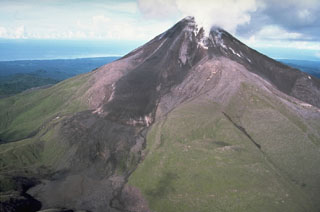Report on Bagana (Papua New Guinea) — November 1985
Scientific Event Alert Network Bulletin, vol. 10, no. 11 (November 1985)
Managing Editor: Lindsay McClelland.
Bagana (Papua New Guinea) Explosions; weak glow; increased seismicity
Please cite this report as:
Global Volcanism Program, 1985. Report on Bagana (Papua New Guinea) (McClelland, L., ed.). Scientific Event Alert Network Bulletin, 10:11. Smithsonian Institution. https://doi.org/10.5479/si.GVP.SEAN198511-255020
Bagana
Papua New Guinea
6.137°S, 155.196°E; summit elev. 1855 m
All times are local (unless otherwise noted)
"A moderate level of activity was observed during November with occasional reports of weak nighttime glows from the summit crater and occasional audible explosions. Seismic activity increased in the middle of the month to about 50 earthquakes per day. Previous levels were generally less than 10. This level of seismic activity persisted to the end of the month."
Geological Summary. Bagana volcano, in a remote portion of central Bougainville Island, is frequently active. This massive symmetrical cone was largely constructed by an accumulation of viscous andesitic lava flows. The entire edifice could have been constructed in about 300 years at its present rate of lava production. Eruptive activity is characterized by non-explosive effusion of viscous lava that maintains a small lava dome in the summit crater, although occasional explosive activity produces pyroclastic flows. Lava flows with tongue-shaped lobes up to 50 m thick and prominent levees descend the flanks on all sides.
Information Contacts: P. Lowenstein, RVO.

